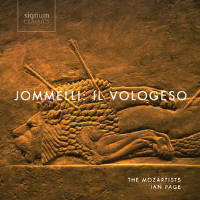Texte paru dans: / Appeared in: |
|
|
Outil de traduction (Très approximatif) |
|
|
Reviewer: Richard Lawrence Il Vologeso was composed towards the end of Jommelli’s time as Ober-Kapellmeister at the court of the Duke of Württemberg. It was premiered on February 11, 1766, in the new theatre at Carl Eugen’s residence in Ludwigsburg, to a libretto by the composer’s long-term collaborator, Mattia Verazi. This was based on Lucio Vero by Zeno, the predecessor of Metastasio as ‘imperial poet’ in Vienna, which had already been set many times. The action takes place in Ephesus. Lucius Verus, joint ruler of the Roman Empire, is laying siege to Berenice, the wife of Vologeses, King of Parthia. He is more than a little embarrassed by the arrival from Rome of his bride-to-be Lucilla, the daughter of his fellow emperor Marcus Aurelius. Vologeses, thought to be dead, is very much alive, though a prisoner. Verus offers to spare his life if he will give up Berenice. Vologeses and Berenice both contemptuously reject the exchange. Verus orders Lucilla and Flavius, the emissary escorting her, to return to Rome; but Flavius is appalled by Verus’s behaviour and, instead of obeying, he rescues the enemy Vologeses. A fight is prevented by Lucilla, whereupon Verus agrees to do the right thing by marrying her after all and allowing Vologeses and Berenice to return to their kingdom. A pretty feeble story, you might think; but there is more to it than this bald summary would suggest. In particular, the character of Verus is subtly drawn. Genuinely smitten with Berenice, he reflects sadly that she will not return his love. He can’t bring himself to confess to Lucilla that he loves Berenice until halfway through the action, when he admits his sense of shame; but when Lucilla forgives him he lashes out and insults her. In an effort to win Berenice round – this is weird – he lets her think that in a basin covered in a cloth she will find Vologeses’s head; in fact it contains a crown and sceptre. He can rage, but nobody actually gets executed. Three of the four male parts were written for a castrato, which can be confusing; fortunately, a libretto and translation are provided. The drama is considerably enhanced by Jommelli’s use of accompagnato recitative, where the orchestra can reflect the character’s emotions. There’s a fine example towards the end, a repeated dotted figure introducing a mad scene for Berenice. Each act concludes with an ensemble: remarkably, a quartet turns into a duet, and the Act 2 trio ends with a remorseful Verus alone. Flutes appear briefly; otherwise the arias are accompanied by the strings, with or without oboes and horns. The cast, recorded at a concert with no subsequent patching, is excellent. Stuart Jackson, so impressive at this year’s Proms as the Evangelist in Bach’s St Matthew Passion, reveals all the facets of Verus’s troubled character. After an accompanied recitative of self-doubt, the co-emperor has a near mad scene of his own, vividly put across by Jackson and the orchestra. With dazzling coloratura he sounds heroic, like Mozart’s Idomeneus, when he sings later of the tempest agitating his heart. Zeno’s original libretto, as I mentioned above, was called Lucio Vero. Despite the retitling, Vologeso (to give him his operatic name) is not portrayed so vividly. But Rachel Kelly is splendid in defiance, and he/she is well matched with the brighter tones of Gemma Summerfield’s loving Berenice. Lucilla, struggling in vain to conquer her love for the undeserving Verus, is vividly taken by the darker mezzo of Angela Simkin. Jennifer France and Tom Verney both have the chance to shine, and shine they do. I would question the choice of the Assyrian Lion Hunt in the British Museum for the illustration, the palace at Nineveh being remote from Ephesus in every conceivable way, but that is a small matter. This is a fine achievement by The Mozartists and Ian Page. |
|




